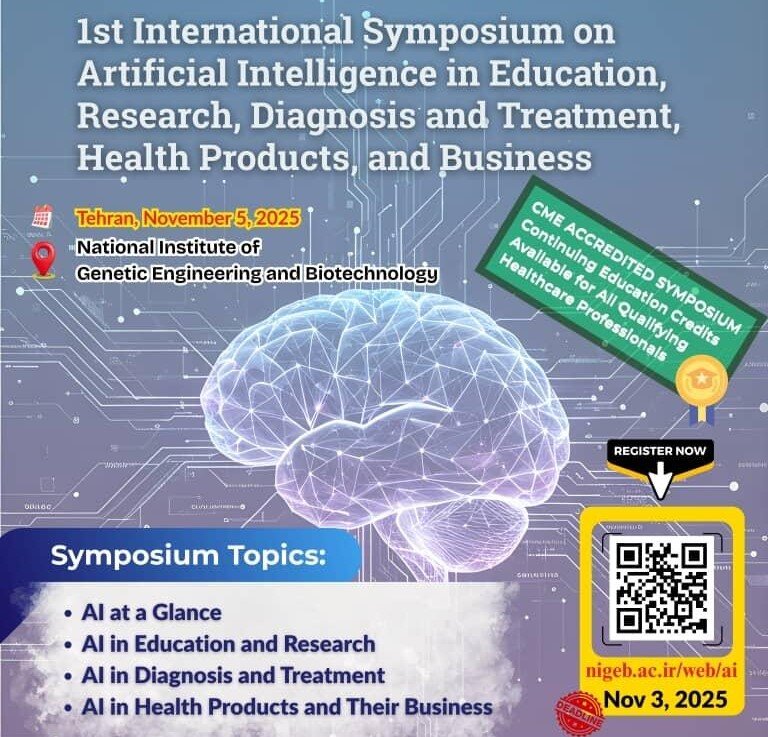The National Institute of Genetic Engineering and Biotechnology in Tehran is set to host its inaugural international AI symposium on November 5. This landmark event will delve into the multifaceted role of artificial intelligence in domains such as education, research, diagnosis, treatment, and the production of health-related products. As AI continues to permeate various sectors, the symposium aims to highlight both its transformative potential and the ethical considerations it entails.
AI in Healthcare: A Catalyst for Cost Efficiency
One of the symposium's key areas of focus will be the application of AI in healthcare, where it has already demonstrated significant cost-saving potential. AI technologies, particularly in clinical decision support and imaging analysis, are being recognized for their ability to reduce expenses dramatically. In certain cases, such as breast and lung cancer diagnostics, AI has been shown to cut costs by up to 80%. This is achieved through enhanced accuracy and efficiency in medical imaging and treatment planning.
Dr. Amir Hosseini, a leading researcher in AI applications for healthcare, emphasized the importance of these advancements:
"AI's ability to process vast amounts of data with precision is revolutionizing our approach to complex medical conditions. The potential for cost savings is immense, but we must also navigate the ethical implications of AI-driven healthcare," he stated.
Education and Research: The Dual Edge of AI
Beyond healthcare, the symposium will explore AI's impact on education and research. While AI offers the promise of personalized learning experiences and accelerated research processes, it also raises critical questions about data privacy and academic integrity. The integration of AI tools in educational settings necessitates a careful balance between innovation and regulation.
Experts warn that without robust guidelines, educational institutions may face challenges related to the misuse of AI technologies. The symposium will address these concerns, aiming to provide a framework for the ethical deployment of AI in education and research sectors.
Ethical Considerations and Regulatory Challenges
As AI continues to evolve, the symposium will serve as a platform for discussing the broader societal impacts of these technologies. The ethical considerations surrounding AI, particularly in sensitive areas such as healthcare and education, require vigilant oversight and comprehensive policy development. The symposium will bring together international experts to share insights and propose strategies for responsible AI integration.
Originally published at http://www.tehrantimes.com/news/519681/First-intl-AI-symposium-on-education-research-production-in
ResearchWize Editorial Insight
This symposium is a pivotal event for students and researchers, spotlighting AI's transformative role in education and healthcare. It matters because it addresses the dual-edged nature of AI—its potential to revolutionize and its ethical pitfalls.
In healthcare, AI's ability to cut costs by up to 80% in diagnostics like cancer is a game-changer. For researchers, this means exploring AI's potential to enhance medical accuracy and efficiency while grappling with ethical concerns about data use and patient privacy.
In education, AI promises personalized learning but risks data privacy breaches and academic integrity issues. Students and researchers must consider how to harness AI's benefits without compromising ethical standards.
The symposium's focus on ethical considerations and regulatory challenges is crucial. It calls for robust guidelines to prevent misuse and ensure responsible AI integration. This is a chance for students and researchers to engage with policy development and ethical frameworks that will shape the future of AI in their fields.
The big question: How can we balance AI's transformative potential with the need for ethical oversight? This event is a step toward answering that, offering insights and strategies that could influence global AI policy and practice.
Looking Ahead
1. Curriculum Overhaul: The education system must pivot rapidly to integrate AI literacy across all levels. This isn't just about coding or data science; it's about understanding AI's societal impacts, ethical dilemmas, and potential biases. What happens if our schools continue to teach outdated skills while the world races forward? The gap between education and industry demands is widening. Time to bridge it.
2. Teacher Training: Educators need robust training to effectively incorporate AI tools in classrooms. Are our teachers ready to navigate AI-driven education? Without proper guidance, AI could become just another buzzword rather than a transformative tool. We must invest in continuous professional development to ensure teachers are not left behind.
3. Ethical Frameworks: As AI becomes ubiquitous in education, establishing clear ethical guidelines is non-negotiable. How do we protect student data and privacy while leveraging AI's potential? Institutions must develop policies that prioritize transparency and accountability, ensuring AI tools are used responsibly and ethically.
4. Interdisciplinary Approach: AI education should not be siloed within computer science departments. Instead, it must be woven into the fabric of various disciplines—from humanities to sciences—highlighting AI's diverse applications and implications. Will universities recognize AI's interdisciplinary nature, or will they cling to outdated departmental divides?
5. Collaboration with Industry: Schools and universities must forge partnerships with tech companies to stay ahead. Industry insights can inform curriculum development and ensure students acquire relevant skills. But what are the risks of letting private interests dictate educational content? Striking a balance is crucial to maintain academic integrity.
6. Policy and Regulation: Governments must act swiftly to establish regulatory frameworks that guide AI's educational application. What happens if regulators fall behind? The resulting vacuum could lead to unchecked AI deployment, with significant implications for equity and access. Policymakers need to lead, not follow.
Originally reported by http://www.tehrantimes.com/news/519681/First-intl-AI-symposium-on-education-research-production-in.
Related Articles
- TMU hosts THE Global AI Summit 2025
- Faculty-student duo illuminate generative AI’s potential to transform computer science education
- ChatGPT vs Perplexity Web Search: PhD Student Found Winner for Academic Research
📌 Take the Next Step with ResearchWize
Want to supercharge your studying with AI? Install the ResearchWize browser extension today and unlock powerful tools for summaries, citations, and research organization.
Not sure yet? Learn more about how ResearchWize helps students succeed.

